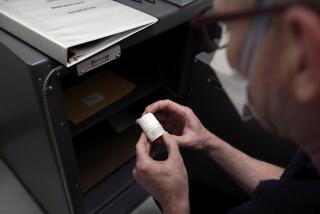Tell Us About the Flops Too
- Share via
It’s human nature to talk about our good deeds while keeping mum about the bad ones. This applies not only to schoolkids and presidents but to medical researchers. According to several recent investigations, scientists are far more likely to publish the results of a drug study when it concludes that the drug works than when it indicates that the drug is ineffective or harmful.
For years, drug industry lobbyists have thwarted most efforts to require disclosure of drug research. At last the American Medical Assn. has taken a strong stand in opposition. On Tuesday, the doctors group wrote to Health and Human Services Secretary Tommy G. Thompson urging creation of a National Institutes of Health database, available to the public, of all U.S. clinical drug trials and their findings -- negative as well as positive. On Thursday, Merck, one of the largest pharmaceutical companies, got behind the idea too.
This sounds like a small reform. In fact, it’s hard to believe such a list doesn’t exist already. But it doesn’t, and the consequence is well illustrated by the case of UC San Francisco researcher Betty Dong, as first reported in the Wall Street Journal. The drug company Boots Pharmaceuticals Inc., now Knoll Pharmaceutical, had hired Dong to study the effect of the company’s lucrative thyroid medicine, Synthroid. Dong concluded that the drug worked no better than a cheaper generic alternative. She then spent five years, starting in the early 1990s, fighting the company’s efforts to prevent her from publishing her findings.
In a more recent example, New York Atty. Gen. Eliot Spitzer filed a lawsuit this month accusing the British drug maker GlaxoSmithKline of suppressing the publication of studies suggesting that its antidepressant drug Paxil could lead some adolescents to harm themselves. Spitzer relied on a New York law against misrepresentation by manufacturers.
There’s also a federal law that supposedly requires researchers to register clinical trials of drugs for serious or life-threaten- ing conditions in a federal database, clinicaltrials.gov. According to a study in the British Medical Journal, however, U.S. companies post only half of their eligible trials.
Drug company funding has led to plenty of medical breakthroughs, and there is always the possibility that being required to publish negative results would discourage financing of some research.
Drug research in the United States is also hampered not only because some drug risks are ignored or underplayed but because others are overplayed.
This is partly the result of excessive regulation (a problem that has been greatly mitigated in recent years, thanks to AIDS activists), because of America’s unique dog-sue- dog litigation culture and because of something in our national psyche that assumes that small risks must produce bad outcomes.
A new flood of information about drugs that don’t work or actually cause harm is likely to make this tendency worse, not better. But patients have the right to know what the drug companies know about products that consumers are induced to buy -- even if the public misuses this information to its own detriment.






